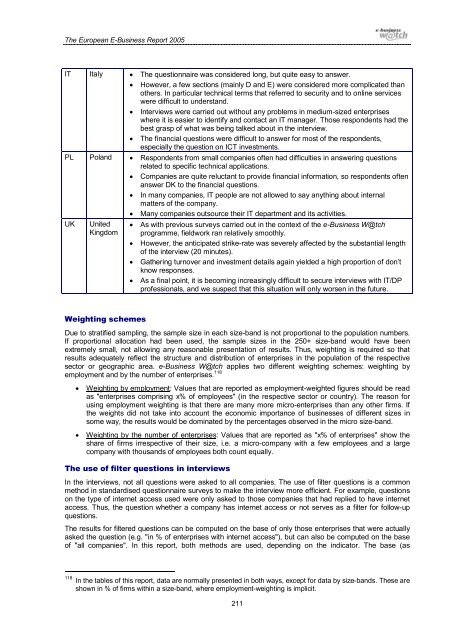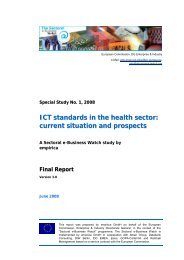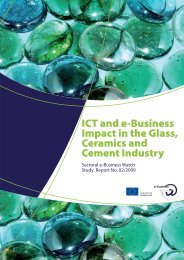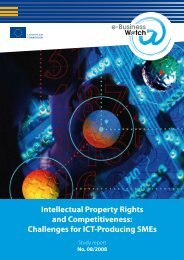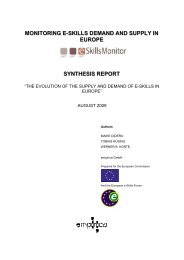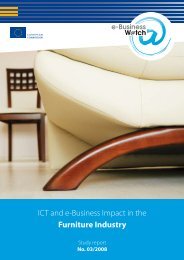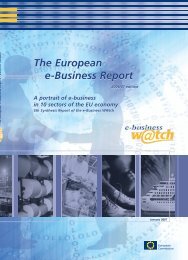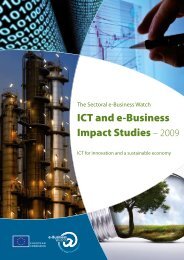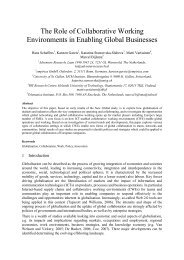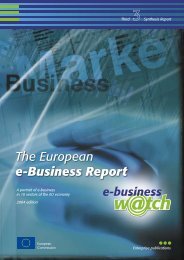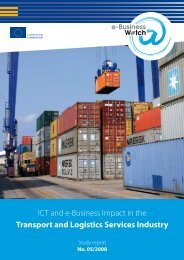The European e-Business Report The European e ... - empirica
The European e-Business Report The European e ... - empirica
The European e-Business Report The European e ... - empirica
Create successful ePaper yourself
Turn your PDF publications into a flip-book with our unique Google optimized e-Paper software.
<strong>The</strong> <strong>European</strong> E-<strong>Business</strong> <strong>Report</strong> 2005<br />
IT Italy • <strong>The</strong> questionnaire was considered long, but quite easy to answer.<br />
• However, a few sections (mainly D and E) were considered more complicated than<br />
others. In particular technical terms that referred to security and to online services<br />
were difficult to understand.<br />
• Interviews were carried out without any problems in medium-sized enterprises<br />
where it is easier to identify and contact an IT manager. Those respondents had the<br />
best grasp of what was being talked about in the interview.<br />
• <strong>The</strong> financial questions were difficult to answer for most of the respondents,<br />
especially the question on ICT investments.<br />
PL Poland • Respondents from small companies often had difficulties in answering questions<br />
related to specific technical applications.<br />
• Companies are quite reluctant to provide financial information, so respondents often<br />
answer DK to the financial questions.<br />
• In many companies, IT people are not allowed to say anything about internal<br />
matters of the company.<br />
• Many companies outsource their IT department and its activities.<br />
UK<br />
United<br />
Kingdom<br />
• As with previous surveys carried out in the context of the e-<strong>Business</strong> W@tch<br />
programme, fieldwork ran relatively smoothly.<br />
• However, the anticipated strike-rate was severely affected by the substantial length<br />
of the interview (20 minutes).<br />
• Gathering turnover and investment details again yielded a high proportion of don’t<br />
know responses.<br />
• As a final point, it is becoming increasingly difficult to secure interviews with IT/DP<br />
professionals, and we suspect that this situation will only worsen in the future.<br />
Weighting schemes<br />
Due to stratified sampling, the sample size in each size-band is not proportional to the population numbers.<br />
If proportional allocation had been used, the sample sizes in the 250+ size-band would have been<br />
extremely small, not allowing any reasonable presentation of results. Thus, weighting is required so that<br />
results adequately reflect the structure and distribution of enterprises in the population of the respective<br />
sector or geographic area. e-<strong>Business</strong> W@tch applies two different weighting schemes: weighting by<br />
employment and by the number of enterprises. 118<br />
• Weighting by employment: Values that are reported as employment-weighted figures should be read<br />
as "enterprises comprising x% of employees" (in the respective sector or country). <strong>The</strong> reason for<br />
using employment weighting is that there are many more micro-enterprises than any other firms. If<br />
the weights did not take into account the economic importance of businesses of different sizes in<br />
some way, the results would be dominated by the percentages observed in the micro size-band.<br />
• Weighting by the number of enterprises: Values that are reported as "x% of enterprises" show the<br />
share of firms irrespective of their size, i.e. a micro-company with a few employees and a large<br />
company with thousands of employees both count equally.<br />
<strong>The</strong> use of filter questions in interviews<br />
In the interviews, not all questions were asked to all companies. <strong>The</strong> use of filter questions is a common<br />
method in standardised questionnaire surveys to make the interview more efficient. For example, questions<br />
on the type of internet access used were only asked to those companies that had replied to have internet<br />
access. Thus, the question whether a company has internet access or not serves as a filter for follow-up<br />
questions.<br />
<strong>The</strong> results for filtered questions can be computed on the base of only those enterprises that were actually<br />
asked the question (e.g. "in % of enterprises with internet access"), but can also be computed on the base<br />
of "all companies". In this report, both methods are used, depending on the indicator. <strong>The</strong> base (as<br />
118 In the tables of this report, data are normally presented in both ways, except for data by size-bands. <strong>The</strong>se are<br />
shown in % of firms within a size-band, where employment-weighting is implicit.<br />
211


